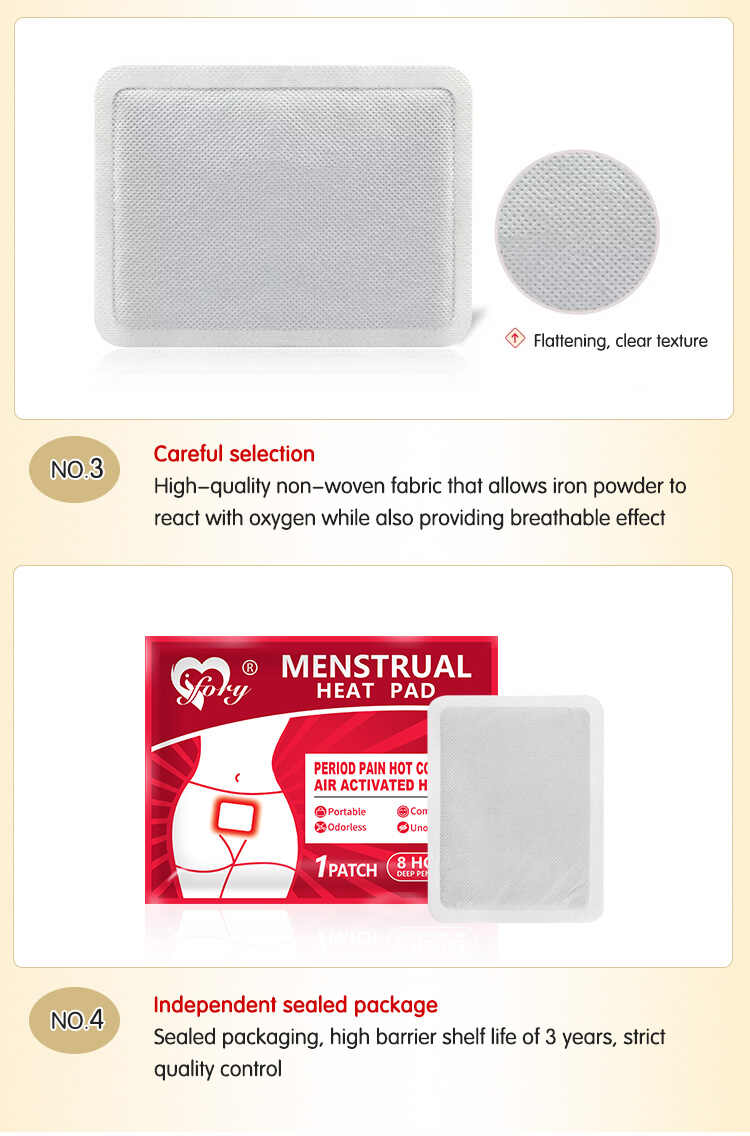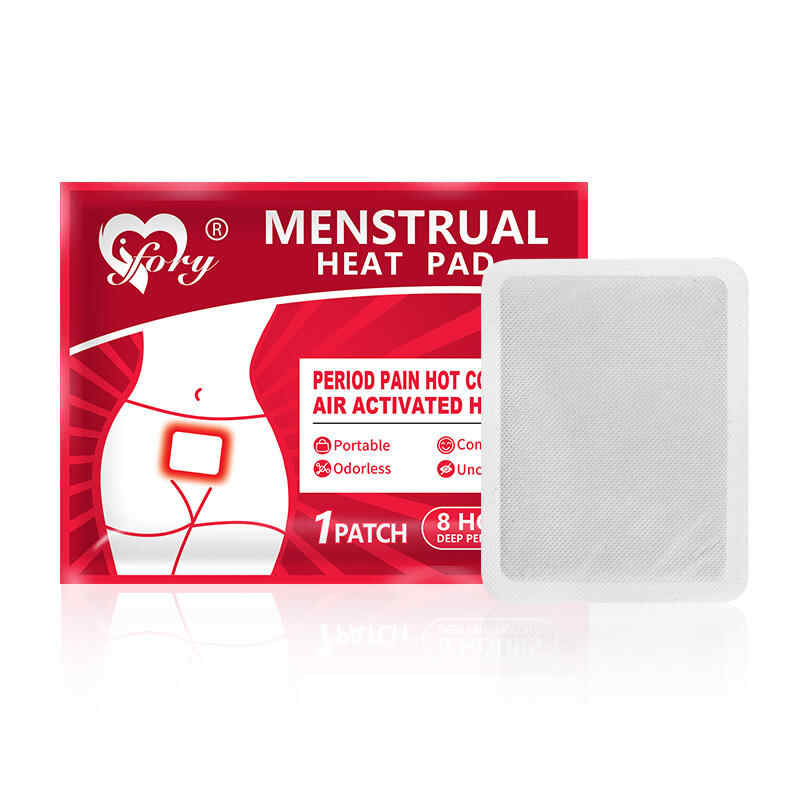Do Custom Period Heating Pads Require Special Testing?
As the demand for menstrual comfort products continues to rise, Custom Period Heating Pads have become a preferred choice for brands seeking to offer innovative, targeted, and personalized solutions. However, customization introduces complexity—especially when it comes to quality and safety assurance. The question many businesses ask is: Do Custom Period Heating Pads require special testing?
The answer is yes. Customization—whether in materials, temperature settings, design, or packaging—often changes a product’s performance profile, making specialized testing essential. In this article, we’ll explore why special testing is critical, what types of tests are typically required, and how Period Heating Pad Manufacturers, OEM partners, and Private Label Period Heating Pad Suppliers ensure that custom products meet international safety and performance standards.

1. Why Testing Matters for Custom Period Heating Pads
Testing plays a vital role in product reliability, user safety, and market compliance. For any Period Heating Pad Manufacturer, every change in material composition, heating element design, or adhesive layer can affect the product’s thermal performance, safety, and skin compatibility.
When developing Custom Period Heating Pads, these variations must be validated through specialized testing to ensure that:
The pad maintains consistent heating performance.
It remains safe for prolonged skin contact.
The adhesive and materials do not cause irritation.
Electrical or thermal components comply with regulatory standards.
A Period Heating Pad OEM that skips or minimizes these tests risks product recalls, brand damage, or regulatory penalties—especially when selling in markets like the EU or USA, where compliance standards are strict.
2. The Impact of Customization on Product Testing Requirements
Customization is one of the biggest strengths of working with a Period Heating Pad OEM. Brands can tailor every detail, from heat duration to pad shape and scent. However, these customizations also affect how testing is performed.
2.1. Ingredient or Material Customization
When a Custom Period Heating Pad uses different materials (such as eco-friendly fabrics, natural heating elements, or biodegradable films), it changes the product’s thermal conductivity, flexibility, and adhesive behavior.
Therefore, manufacturers must test for:
Thermal uniformity: Ensuring consistent temperature distribution.
Material safety: Checking for skin irritation, toxicity, and allergic reactions.
Durability: Verifying that new materials withstand heating cycles without degradation.
2.2. Heating Element Adjustments
If the OEM modifies the heating mechanism (e.g., switching from iron-based chemical heat to electric or reusable gel heat), the pad’s safety profile changes. Testing must confirm:
Controlled temperature rise and decline.
Overheating protection mechanisms.
Electrical safety compliance (if applicable).
2.3. Design and Size Variations
Custom shapes or pad sizes influence how heat is distributed and retained. Uneven heating can cause burns or discomfort, making thermal imaging and safety testing essential for Custom Period Heating Pads.
2.4. Adhesive and Backing Layer Modifications
Changing adhesive types or thickness affects skin breathability and user comfort. Testing ensures adhesion strength, residue levels, and ease of removal remain within safe and comfortable limits.
3. Types of Tests Required for Custom Period Heating Pads
A certified Period Heating Pad Manufacturer typically conducts a series of specialized tests before approving any new or custom product for mass production. These include:
3.1. Thermal Performance Testing
This is the most critical test for Custom Period Heating Pads. It measures:
Heating rate: How quickly the pad reaches its intended temperature.
Temperature stability: Whether it maintains safe, consistent heat over time.
Maximum surface temperature: Ensuring no risk of burns or overheating.
3.2. Skin Irritation and Biocompatibility Tests
Since Period Heating Pads are worn on the skin for several hours, testing for skin sensitivity and biocompatibility is crucial. Manufacturers test for:
Allergic reactions
pH balance
Cytotoxicity (cell damage potential)
Such testing is mandatory for compliance with ISO 10993 standards for medical or skin-contact products.
3.3. Safety and Compliance Tests
If the product includes electrical components, tests are conducted according to IEC and CE requirements. These include:
Electrical insulation tests
Short-circuit protection
Temperature cutoff mechanism validation
For non-electrical Custom Period Heating Pads, compliance focuses on chemical reaction safety and air activation control to ensure predictable heating.
3.4. Packaging Integrity and Stability Tests
Customized packaging for Private Label Period Heating Pads must protect against moisture, contamination, and premature heat activation. Therefore, packaging is tested for:
Seal strength
Temperature and humidity resistance
Product shelf life under different storage conditions
3.5. Environmental and Eco-Safety Testing
With growing demand for eco-friendly menstrual products, sustainable materials must be tested for biodegradability and environmental impact. Certified Period Heating Pad OEMs often conduct these tests to support green product claims.
4. International Testing Standards for Custom Period Heating Pads
Compliance with global standards ensures that products can be safely sold across different markets. A reputable Period Heating Pad Supplier typically aligns with these frameworks:
ISO 9001: Quality management and consistency across production.
ISO 13485: Medical device manufacturing standards.
CE Certification: Compliance with EU safety and environmental directives.
RoHS (Restriction of Hazardous Substances): Ensures no harmful chemicals or metals are used.
REACH (EU Regulation): Confirms chemical safety and transparency.
FDA Standards (for U.S. markets): Applicable if the product is marketed for therapeutic use.
These standards collectively ensure that every Custom Period Heating Pad performs reliably, safely, and consistently, no matter the degree of customization.
5. How OEM and Private Label Partners Manage Testing
When brands work with a Period Heating Pad OEM, testing responsibilities are typically shared between the manufacturer and the client.
5.1. Manufacturer Responsibilities
The Period Heating Pad Manufacturer is responsible for:
Conducting in-house and third-party safety tests.
Documenting quality control results.
Providing Certificates of Analysis (CoA) and Material Safety Data Sheets (MSDS).
Ensuring regulatory compliance before mass production.
5.2. Brand Responsibilities
Brands launching Private Label Period Heating Pads may request:
Product sample testing for independent validation.
Compliance documentation for marketing or import purposes.
Adjustments in design or formulation based on test outcomes.
Collaborating closely ensures that every Custom Period Heating Pad meets both regulatory and brand-specific performance expectations.
6. The Role of Third-Party Testing Labs
Independent testing agencies play a crucial role in validating the safety and performance of customized products. Leading Period Heating Pad OEMs often work with certified laboratories to provide objective, verifiable results.
These third-party labs perform:
Heat curve analysis
Toxicological safety evaluations
Shelf-life stability testing
Packaging and adhesive durability tests
Third-party verification strengthens brand credibility and satisfies the import regulations of multiple countries.
7. What Happens If Testing Is Ignored
Ignoring or minimizing testing for Custom Period Heating Pads can have serious consequences:
Regulatory failure: Products may be banned or recalled.
Brand damage: Consumers may lose trust due to safety incidents.
Legal liability: Injuries or allergic reactions can result in lawsuits.
Market rejection: Retailers often refuse to stock uncertified or untested items.
For any Period Heating Pad Supplier, rigorous testing is not optional—it’s essential for risk mitigation and market credibility.
8. Benefits of Thorough Testing for Brands and OEM Partners
Investing in proper testing provides numerous advantages for both manufacturers and private label brands:
Enhanced consumer trust: Tested products are more likely to gain repeat buyers.
Regulatory compliance: Smooth access to international markets.
Fewer product returns: Reduced risk of quality complaints.
Long-term brand reputation: A foundation built on transparency and safety.
Working with an experienced Period Heating Pad Manufacturer ensures that all testing procedures are integrated into the production process—saving time, cost, and potential regulatory headaches.
9. Choosing the Right OEM Partner for Custom Period Heating Pad Testing
When selecting a Period Heating Pad OEM or Supplier, prioritize those who:
Have in-house laboratories or established partnerships with certified testing agencies.
Provide detailed testing reports and compliance certificates.
Offer customization support while maintaining strict quality control.
Hold recognized certifications like ISO and CE.
These indicators show that the manufacturer can balance creativity and compliance—ensuring your Custom Period Heating Pad is both unique and safe.
10. The Future of Testing in Period Heating Pad Manufacturing
With the rise of wearable technology and sustainable materials, testing standards will continue to evolve. Future Period Heating Pad Manufacturers may incorporate AI-driven heat control systems or smart sensors, requiring new testing methods for performance and safety.
Additionally, growing consumer awareness around eco-friendly and medical-grade products will make third-party testing and transparent labeling even more critical for global success.
Conclusion
Yes, Custom Period Heating Pads absolutely require special testing. Customization alters key product characteristics, making it essential to verify safety, performance, and compliance at every stage of production. Partnering with a certified and experienced Period Heating Pad Manufacturer or Period Heating Pad OEM ensures your brand delivers reliable, comfortable, and compliant products to customers.
Whether you’re developing a Private Label Period Heating Pad line or introducing innovative custom designs, specialized testing protects your business, your customers, and your brand reputation. In today’s health-conscious market, quality and compliance aren’t optional—they’re your greatest competitive advantage.
Related Questions and Answers
Q1: What kind of tests are mandatory for Custom Period Heating Pads?
A: Mandatory tests include thermal stability, skin irritation, biocompatibility, and safety compliance tests (ISO, CE, and RoHS).
Q2: Do all Custom Period Heating Pads need third-party testing?
A: While not always legally required, third-party testing is strongly recommended to verify OEM test results and support global distribution.
Q3: How long does testing for Custom Period Heating Pads take?
A: Depending on complexity, full testing and certification may take 2–6 weeks before mass production.
Q4: Can I use my OEM manufacturer’s testing certifications for my Private Label Period Heating Pads?
A: Yes, reputable OEMs provide certification documentation that can support your brand’s compliance claims.
Q5: What happens if my Period Heating Pad fails testing?
A: The manufacturer must revise the formulation or design, re-test the product, and ensure compliance before it can be marketed or sold.






